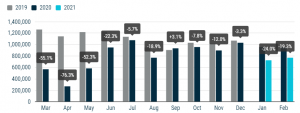The European car market is in a sharp decline. According to data from the European Automobile Manufacturers Association (ACEA), year-on-year car sales fell by 24% in January and 19.3% in February. After a promising December, when the year-on-year decline was only 3.3%, this is a shock. What can you do as a dealer to maintain your sales performance?
The entire EU is in the same boat, with one exception
The drop in sales has affected all EU Member States. The largest year-on-year decreases were recorded in January and February in Lithuania (-46.5%), Portugal (-44.6%), and Denmark (-40.1%), with the smallest in Estonia (-8.8%), Finland (-8%), and Hungary (-6.8%). However, one and only country saw an increase in sales, and that was Sweden, by 12.8%. Sweden is known for its completely different approach to protecting its population from the coronavirus. This is the only significant difference from other EU Member States. Sweden has invested in maintaining normal life with some limited restrictions. Car sales have more than felt the positive effect of this policy.

Figure 1 – Source: ACEA
Other more sparsely populated countries in Europe are also holding steady
Outside the EU, there was another country that saw some growth, and that was neighboring Norway. There, sales increased by 5.4% year-on-year. Norway is unique in being the the only European country in the world to belong to the top 10 countries who best dealt with the coronavirus crisis, at least according to Bloomberg. In March, Norway had only 362 infections per 100,000 inhabitants, however, in all key metrics it did not differ much from the number 14 ranked Denmark, where car sales fell sharply.
However, the main driver for the increase in car sales is probably the enormous size of the country and the associated population density, which is the lowest in continental Europe (14 people per km2). Finland (16 people per km2), Sweden (23 people per km2), and Estonia (29 people per km2) are also not densely populated countries. In addition, Norway has long supported the sales of electric cars, which make up a considerable proportion of all cars sold. In contrast, neighboring Denmark, which has seen car sales fall sharply, has a relatively high population density (135 people per km2), which is similar to Portugal (112 people per km2). An exception, however is Lithuania (43 people per km2), where the state of the economy following coronavirus may play a role, as well as Hungary (105 people per km2), which is on the other side of the spectrum as the one of the few countries in Europe which closed its state borders.
What to do about declining sales
European market data clearly shows that declining sales affects the vast majority of European countries. It is due to both the economic recession and, apparently, a change in people’s habits. Where governments have implemented lockdowns, travel has simply decreased, and so has the need to buy new cars. Car dealerships in countries with higher population densities have a greater problem, where public transport is usually more accessible and there is less of a need for long journeys to work. While cars used to be sold widely and often according to similar rules and pan-European marketing campaigns, the COVID-19 pandemic has created massive differences between countries and groups. Presently, such widespread campaigns simply do not work anymore because in most European countries, only certain groups of population really need cars. What can be done about this?
Cars are sold only by those who know what customers need them
In order to continue selling, you need to know your customers in great detail. And you just have to be able to find them at the right time. It is obviously easier in Sweden than in Denmark. The examples of Sweden and Norway may also give dealers in other countries the hope that when life in a given country returns to normal, car sales will resume. Until then, however, it is necessary to incorporate all the appropriate marketing skills and corresponding tools. The key to success will be the extraction of current customer data, for example from the service center, but also from certain social networks.
Automotive CRM, a cloud CRM that can incorporate data from service, sales, e-mail, and phone contacts, as well as interactions from social media thanks to which it provides a perfect 360° view of each potential customer, can help you. It can then divide the customers into various groups, to which it can precisely target marketing campaigns. In short, it allows you to sell specific models that meet the specific needs that specific customer groups looking for new or even used cars may need. For example, families with newborns, families with a 3rd child, or companies and individuals whose current car has rising service costs and is likely at the end of its life.
Sources
https://www.bloomberg.com/graphics/covid-resilience-ranking/
https://en.wikipedia.org/wiki/Area_and_population_of_European_countries




